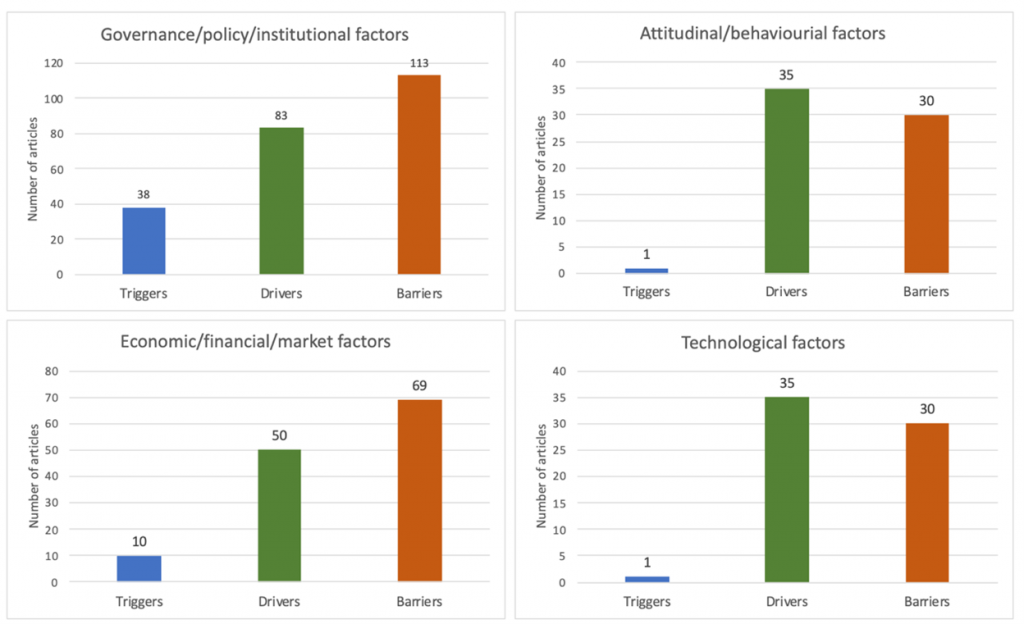
Words by Brendan Moore
The past decade has witnessed a “transformative turn” in the social science literature on climate change mitigation as academics and policy makers increasingly use the concept of “transformations” to describe the rapid, fundamental societal changes needed to meet the goals of the Paris Agreement.
How does this growing literature conceptualize transformation, and what are the key findings of studies that focus on transformational climate change mitigation? For the first time, our recent systematic review, published in WIREs Climate Change begins to answer some of these questions by analysing 198 mitigation-focused articles that use transformation-related terms and concepts.
Our findings
Between 2000 and 2019, our review identified 652 articles which focused on climate change mitigation and used transformation-related terms and concepts (Figure 1). We prioritized 198 of these articles for in-depth analysis according to their level of engagement with transformation.
Transformation terminology was widespread in these prioritized articles: we found 6,937 occurrences of transformation terminology and identified 1,584 distinct terms, such as energy transformation, governance transformation, and transformational change. However, we were only able to identify explicit definitions for 213 of the 1584 transformation-related terms (13%).

Figure 1 Peer-reviewed social science articles in Scopus published between 2000 and 2019 that focus on climate change mitigation and use transformation-related terminology (n = 652).
The literature focused heavily on transformations in the energy sector (mentioned in nearly 50% of the articles) and governance, policy and politics. There was much less focus on difficult-to-mitigate sectors such as material consumption and diet, food and agriculture.
It was also very focused on high-income countries (nearly 75% of mentions); only two articles focused on low-income countries. Europe was by far the most studied region.
The articles used a wide range of theories, including critical theories (e.g., energy democracy; governmentality), socio-technical transitions (e.g., the multi-level perspective) and political science. However, we identified both a theory and a method in only 35% of articles, and in 18% we were not able to identify either a theory or a method.
There were a variety of transformation triggers, drivers, and barriers cited in the articles. Common factors included governance and institutions, finance and costs, individual behaviours, and technological change (see Figure 2). These factors could be act as both a driver and a barrier of change.

Figure 2 Most common transformation triggers, drivers and barriers
Articles also mentioned several co-benefits of mitigation transformations, including economic, distributional, health, and air quality benefits. Economic co-benefits included the creation of jobs, businesses, and general economic growth. Some articles referred to co-benefits that strengthen social and environmental justice, others mentioned biodiversity co-benefits.
Transformational climate change mitigation
In order to move toward shared understandings and a more cumulative approach to research, we proposed the umbrella term of transformational climate change mitigation as:
“Climate change mitigation that is sufficiently broad, deep, and rapid to contribute to fulfilling the goals of the Paris Agreement and which involves a fundamental shift in the trajectory of societal change away from patterns of development that normalize high-carbon ways of living.”
This term encompasses the multiple mitigation-related transformations—operating across diverse sectors, levels and geographical scales—that together constitute global climate change mitigation.
Recommendations for academics and policy makers
In the review, we noted the widespread conceptual ambiguity surrounding transformations and the relative lack of shared definitions, which constitutes a challenge for research and policy. This challenge calls for collaboration between academics and policy makers on creating user-friendly, shared definitions, something that has already begun to happen.
The literature we reviewed covered a wide range of topics, but there were areas that deserve more attention, including research on:
- Systematic reviews on specific sectors that bring together findings and recommendation from literature on both transformational mitigation (analysed here) and transformational adaptation.
- New empirical work on transformations in specific sectors/locations, especially in difficult-to-mitigate sectors such as material consumption, transportation, building heating and cooling, and diet/agriculture, which gained much less attention in the literature reviewed and are likely to require more grassroots, individual-level changes.
- Transformation terminology in the reports of policy-facing institutions such as the IPCC, IPBES, the UNFCCC, and the European Environment Agency.
- Research on transformations in middle- and low-income countries, given that high-income countries were overrepresented in the literature we reviewed.
- A greater focus on society-led and grassroots transformations, building on existing studies.
Towards a more cumulative research programme
In our research, we found a vibrant, rapidly expanding field that attempts to capture and analyse the fundamental changes needed to prevent dangerous climate change. Throughout our review, we have noted findings as well as gaps in the existing literature but feel that there is much to synthesize and build on in the years ahead.
We hope that as the literature on transformational climate change mitigation continues to grow in the coming years, it can help policy makers and others grapple with the significant social, political, and economic challenges ahead on the road to meeting the goals of the Paris Agreement.
—
This blog post is based on a recently published, open access article: Moore, B., Verfuerth, C., Minas, A. M., Tipping, C., Mander, S., Lorenzoni, I., Hoolohan, C., Jordan, A. & L. Whitmarsh (2021). Transformations for climate change mitigation: A systematic review of terminology, concepts and characteristics. Wiley Interdisciplinary Reviews: Climate Change (Online version of record).
